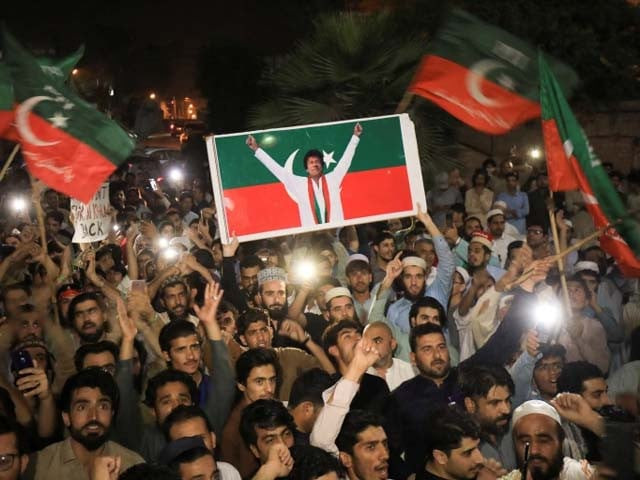“He (Imran Khan) is such a gutsy and brave man! Look how he destroyed the combined opposition of Asif Ali Zardari, Shahbaz Sharif and Maulana Fazlur Rehman singlehandedly!” I got this text message from a friend – who is a Pakistan Tehreek-e-Insaf (PTI) supporter – at precisely the moment when the then Deputy Speaker of the National Assembly, Qasim Suri, had “dismissed” the no-confidence motion tabled against the PTI government, sending the country into political uncertainty and turmoil.
I was perturbed by his stance as he was framing cowardice and deliberate misinterpretation of the constitution as bravery. A few days later, the same friend was lashing out against the Supreme Court for “interfering” in parliamentary proceedings when it ordered the speaker to ensure that the no-confidence motion be carried out on April 9, 2022. Subsequently, after several deliberate delays, when finally the vote was held and Imran was ousted from power, I was bombarded with text messages from my aforementioned friend abusing the judiciary and the armed forces for “betraying” Pakistan. I continue to receive such texts from him daily, and he is not the only one. I get almost identical messages from several other close friends who, like him, are educated, sophisticated and hold good jobs in the corporate sector.
Never in my life have I seen such blatant violations of democratic and constitutional norms being aggressively defended by apparently educated individuals. After the ouster of Imran, I have seen videos of PTI supporters burning passports, comparing Imran to Imam Hussain, and even videos where his supporters are comparing Imran to Prophets. Likewise, a huge majority of his supporters are apparently willing to believe the highly unfathomable theory that his ouster was some grand conspiracy by the United States (US). It seems that PTI is not a party but a fascist cult which is now slowly morphing into a political religion. Imran is not merely a political leader but a demigod who has to be vigorously defended, unconditionally followed, and venerated to insane levels. Shahid Afridi, himself a very popular figure, found out that even reasonable criticism of Imran could lead to severe backlash from his supporters.
It is said, and with justification, that Imran is a charismatic populist who has been able to create a cultish following. However, I think, Imran’s cultish status has less to do with his personality characteristics and more to do with his core support base. In other words, Imran did not create his base; rather it’s the base who created Imran in his present capacity.
To understand the phenomenon of the present-day Imran, one must understand his core support base. While currently PTI commands at least some support in all strata of society, its central and most aggressive support comes from Pakistan’s urban middle classes, hailing from large metropolises like Karachi, and from cities in Punjab and Khyber Pakhtunkhwa (K-P).
While this class is not monolithic, nor are the individuals falling into this bracket identical, there are broad generalisations which can still be made about them. In a country which is still largely agrarian and has low literacy rates, this class is relatively more educated and therefore highly represented in the media, education sector, civil service, judiciary, corporate sector and office cadre of the armed forces. This lopsided representation in these critical sectors makes this class more powerful than what its raw numbers might suggest.
Moreover, this class is has been exposed to the nationalism which the Pakistani state has tried to cultivate over the past several decades via textbooks and a guided media narrative. This version of nationalism tries to tackle the potential fissures emanating from Pakistan’s ethnic diversity by trying to construct Pakistani identity on a religious basis, and also weaves a narrative according to which Pakistan is a special Muslim country destined to be the vanguard the Islamic Ummah or, in other words, is a “fortress of Islam”. This nationalism naturally leads to a deep mistrust of the outside world, especially Western powers like the US. Consequently, for this class, issues like “national sovereignty” and “independent” foreign policy assume extraordinary importance.
At the same time, this class, due to their better education through English medium schools, is more exposed to the Western lifestyle and culture of consumerism. It’s mainly due to their “successful” exposure to both Pakistani nationalism and the Western lifestyle that the urban middle classes, particularly the upper segments, suffer from a strange, twisted envy of the West. They wish to follow their fashions, prefer their luxury goods and lifestyle, yet are ferociously suspicious of them at the political level.
This class, since it is largely composed of salaried individuals, is also a major taxpayer because for such individuals taxes are deducted at source. Although they pay taxes purely out of compulsion, it has led to their obsession with the financial corruption allegedly committed by politicians.
All the above factors make this class and its political concerns quite different from the rest of the country. While for many in the country major political concerns revolve around basic concerns such as inflation, employment, transport, health care, greater autonomy (if belonging to a minority ethnicity or sect) and access to some state sanctioned benefits, this class is more concerned with corruption, national sovereignty and a host of related issues which do not concern the rest of Pakistani society.
Due to these critical differences, and the fact that that this class is numerically weak, it could be argued that this class does not like democracy. Democracy in the developing countries, particularly if it’s not “regulated”, tends to bring chaos since the coalition building and consensus formation process does not develop quickly. Moreover, since democracy is essentially a game of numbers, tactics adopted by politicians are frowned upon by this class. For them, a large majority of politicians represent the worst of society, and they also hate the right of the masses to vote since many assume that they are uneducated and therefore completely unable to make a rational choice. Hatred of the existing political leadership is deeply rooted in the collective conscience of this class.
Historically, this class has always preferred military rule, or at least active involvement of the military in politics, because it feels that “corrupt” politicians cannot be trusted. Desire for authoritarianism due to a mistrust of democracy and a hatred of politicians is also extremely strong in this class, with many feeling that all we need is a strong and authoritarian leader – like Singapore’s founder Lee Kuan Yew – who can set the country on the path towards progress.
Imran hails from this class and is the first major politician who embodies their characteristics, aspirations, desires and even contradictions. For them, he is not corrupt, represents Pakistan well at the global stage, and is very different from the traditional politicians whom they hate intensely. Although Imran’s apparent grasp over this class in a political sense began in 2011 (before this he had been largely politically insignificant), he had always been idolised by this class. What the mammoth rally held in Lahore on October 30, 2011 did was to create an image of political viability. Before that rally, many belonging to this class respected Imran but dismissed him politically due to his unviability as a potential winner. That successful rally motivated many from the middle-class to become politically involved in electoral democracy as they started to feel that Imran could actually win.
However, while they started to participate and, in the process, started acquiring the taste of electoral politics, they could not develop a respect for all the necessary democratic norms and procedures. The desire for authoritarian rule is too strong, and for them the only thing which matters is that Imran should win at all costs. That is why they were willing to support his dharna in 2014, even though it aimed to bring down an elected government. Likewise, all the dubious steps taken to help PTI win in 2018 were gladly accepted by them. That is why they have also been actively promoting the social media trends about the presidential system.
No wonder that all the unconstitutional steps which Imran took after the no-confidence motion was tabled have also been celebrated by his supporters. In fact, the more Imran deviates from constitutional norms, the more he appears as the “right” kind of leader in the eyes of his core supporters, hence encouraging him to harden his deviant tactics. Imran’s otherwise extremely weak foreign conspiracy theory also resonates with this class as it is predisposed to have deep suspicions about the outside world, particularly the US.
The manner of Imran’s ouster has unfortunately reinforced their manic and unconditional support for him. They now think that all the corrupt elements of the political class and the establishment have joined together to depose the only “honest”, “brave” politician who is also the “last hope” of Pakistan. The poor governance and economic mismanagement during the PTI government has been completely forgotten. Imran’s supporters are determined to bring him back, no matter what the cost.



COMMENTS
Comments are moderated and generally will be posted if they are on-topic and not abusive.
For more information, please see our Comments FAQ